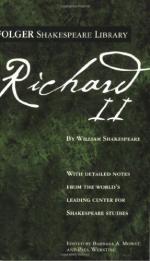|
This section contains 9,293 words (approx. 31 pages at 300 words per page) |

|
SOURCE: Forker, Charles R. Introduction to The Arden Shakespeare: King Richard II, edited by Charles R. Forker, pp. 1-170. London: Thomson Learning, 2002.
In the following excerpt, Forker explores the complex, subtle, and ambivalent means by which Shakespeare renders the principal characters of Richard II.
Characterization: Attitudes Towards Richard and Bolingbroke
Shakespeare inherited divergent and competing interpretations of Richard and Bolingbroke. In the interests of simplification—indeed over-simplification—these have been referred to conventionally as ‘Yorkist’ (pro-Richard) or ‘Lancastrian’ (pro-Henry) according to the dynastic factions that subsequently fostered them for their own political advantage. From the Lancastrian point of view (represented by the majority of English chroniclers), Richard was a weak, incompetent and despotic king, extravagantly self-indulgent, deaf to wise counsel, dominated by corrupt and selfish favourites and altogether ruinous to his country. Bolingbroke, on the other hand, was a justly popular and wronged nobleman, a strong and capable...
|
This section contains 9,293 words (approx. 31 pages at 300 words per page) |

|


